|
|
|
Sort Order |
|
|
|
Items / Page
|
|
|
|
|
|
|
| Srl | Item |
| 1 |
ID:
122116
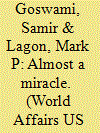

|
|
|
|
|
| Publication |
2013.
|
| Summary/Abstract |
The free public elementary school is closer to ten-year-old Rita's home than the factory where she works ten-hour days instead of getting an education. Rita lives in Bawana, a slum on the northern edge of New Delhi that is home to more than one hundred thousand impoverished residents. In an effort to showcase a prosperous country to a global audience during the 2010 Commonwealth Games, the Indian government displaced thousands of poor people from their makeshift homes in the capital city's center to Bawana. In exchange, they were all promised access to good paying manufacturing jobs in the nearby factories through which they could lift themselves out of poverty and create a better life for their children.
|
|
|
|
|
|
|
|
|
|
|
|
|
|
|
|
| 2 |
ID:
122114
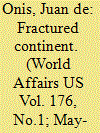

|
|
|
|
|
| Publication |
2013.
|
| Summary/Abstract |
During President Obama's years in office, the United States has pivoted toward Asia, chosen to lead from behind in the Islamic Middle East and Africa, and proposed some new trade and investment initiatives with Europe. And it has virtually ignored Latin America. US relations with its neighbors in the Western hemisphere have for the most part been by-products of its domestic policies on international drug trafficking and illegal immigration-a very weak and unimaginative agenda for a region that is walking a tightrope of conflict between populist authoritarianism and genuine democracy.
|
|
|
|
|
|
|
|
|
|
|
|
|
|
|
|
| 3 |
ID:
122118
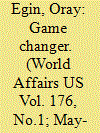

|
|
|
|
|
| Publication |
2013.
|
| Summary/Abstract |
Before Turkish Prime Minister Recep Tayyip Erdogan's government was reelected in July 2007, Erdogan made a calculated decision to shift his foreign-policy focus away from his NATO allies in Europe, where Turkey's European Union membership application had been long stalled. He cast his glance eastward, toward the Middle East, with the intention of establishing himself as the region's preeminent leader and positioning Turkey as the indispensible link between west and east. In April of that year, Erdogan visited Damascus, where he called upon Syria's president, Bashar al-Assad. By all accounts, the two leaders became fast friends. A few months later, the two vacationed together in Bodrum, a beautiful vacation hot spot on Turkey's Aegean Sea coast, where they were joined by their first ladies, Asma and Emine, who also appeared friendly.
|
|
|
|
|
|
|
|
|
|
|
|
|
|
|
|
| 4 |
ID:
122120
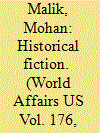

|
|
|
|
|
| Publication |
2013.
|
| Summary/Abstract |
The Spratly Islands-not so long ago known primarily as a rich fishing ground-have turned into an international flashpoint as Chinese leaders insist with increasing truculence that the islands, rocks, and reefs have been, in the words of Premier Wen Jiabao, "China's historical territory since ancient times." Normally, the overlapping territorial claims to sovereignty and maritime boundaries ought to be resolved through a combination of customary international law, adjudication before the International Court of Justice or the International Tribunal for the Law of the Sea, or arbitration under Annex VII of the United Nations Convention on the Law of the Sea (UNCLOS). While China has ratified UNCLOS, the treaty by and large rejects "historically based" claims, which are precisely the type Beijing periodically asserts. On September 4, 2012, China's foreign minister, Yang Jiechi, told US Secretary of State Hillary Clinton that there is "plenty of historical and jurisprudence evidence to show that China has sovereignty over the islands in the South China Sea and the adjacent waters."
|
|
|
|
|
|
|
|
|
|
|
|
|
|
|
|
| 5 |
ID:
122121
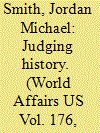

|
|
|
|
|
| Publication |
2013.
|
| Summary/Abstract |
During the volatile confirmation hearings for secretary of defense nominee Chuck Hagel, Republicans asked the former senator for his judgment on the US "surge" in Iraq. Hagel responded: "Well, I would defer to the judgment of history to sort that out."
|
|
|
|
|
|
|
|
|
|
|
|
|
|
|
|
| 6 |
ID:
122113
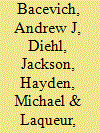

|
|
|
|
|
| Publication |
2013.
|
| Summary/Abstract |
The Iraq War teaches many things, but near the top of the list of lessons that Americans ought to learn (or relearn) is this: It's not a black-and-white world. Statecraft is not a contest pitting innocence against evil. It never has been and it never will be. Any nation choosing to ignore this fundamental reality courts disappointment at the very least and may well invite full-fledged disaster.
|
|
|
|
|
|
|
|
|
|
|
|
|
|
|
|
| 7 |
ID:
122119


|
|
|
|
|
| Publication |
2013.
|
| Summary/Abstract |
Armed conflict devastates a country, straining its institutions to their limits and beyond, shattering the foundations of its economy, and causing immeasurable human suffering and loss. It also calls into question the country's very ability to exist, posing fundamental questions about its worth and capabilities. Why is this happening to us? Will we survive this? How will we ever go forward after such a blow? These are questions that inevitably accompany a losing war or even one with an ambiguous outcome.
|
|
|
|
|
|
|
|
|
|
|
|
|
|
|
|
| 8 |
ID:
122115


|
|
|
|
|
| Publication |
2013.
|
| Summary/Abstract |
It is 2:35 on a Wednesday afternoon at the International School in Beijing. A neat line of orange cones and soccer balls await a class of kindergartners who shed their bright neon backpacks after arriving and immediately stream onto the field in disarray. Their coach manages to corral them just long enough to explain the first drill. Then they sprint off to follow his commands.
|
|
|
|
|
|
|
|
|
|
|
|
|
|
|
|
| 9 |
ID:
122117
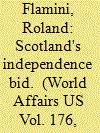

|
|
|
|
|
| Publication |
2013.
|
| Summary/Abstract |
At exactly 17:14 on the evening of September 15, 2012, in Barcelona's Camp Nou stadium, thousands of fans at a packed soccer game stood up as one and chanted, "Independence!" The timing was chosen to coincide with the year 1714, when Spanish troops annexed Catalonia-of which Barcelona is the capital-to Spain. Catalonia has its own distinct language and culture, and Catalan activists have been fanning the flames of separatism ever since.
|
|
|
|
|
|
|
|
|
|
|
|
|
|
|
|
|
|
|
|
|